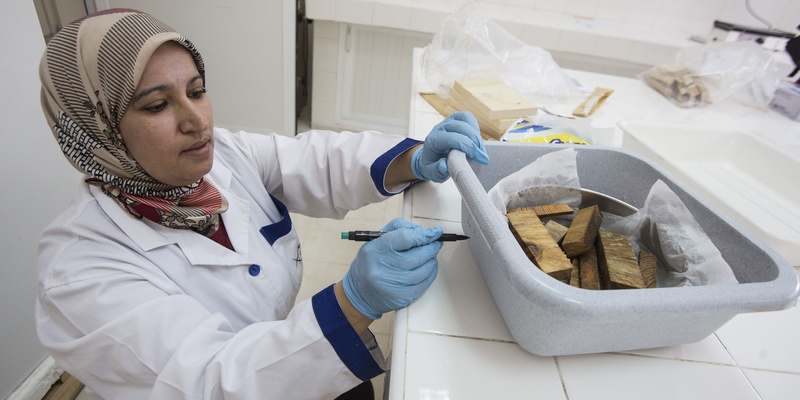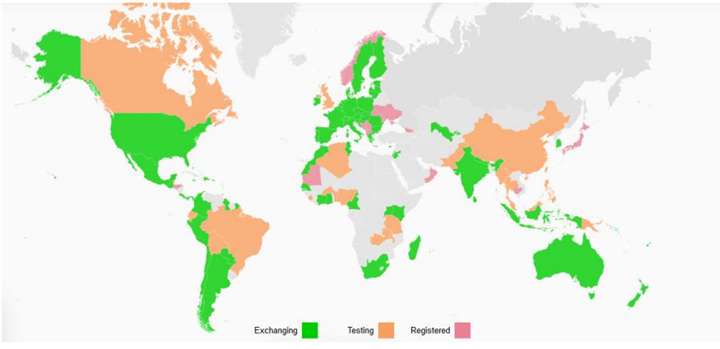Independent evaluation of IPPC ePhyto solution shows successful findings and key recommendations
Posted on Mon, 15 Jan 2024, 08:45

© FAO/Alessandra Benedetti
Rome, 20 December 2023. The Standards and Trade Development Facility (STDF) (STDF) is a global partnership to facilitate safe trade which promotes improved food safety, animal and plant health capacity in developing countries. It recently commissioned an independent evaluation of the International Plant Protection Convention (IPPC) programme known as the "IPPC ePhyto Solution". Launched in 2019, the IPPC ePhyto Solution is a global online system that allows countries to exchange digital phytosanitary certificates called ePhytos to replace paper certificates. Countries send or receive ePhytos through a centralized exchange system called the Hub without requiring bilateral agreements. Countries without a purpose-built system can use the Generic ePhyto National System (GeNS), a centralized web-based system to create, send and receive ePhytos.
Evaluation from STDF is considered an important milestone because it assesses the relevance, coherence, efficiency, effectiveness, sustainability and impact of the ePhyto Solution project implemented by the IPPC Secretariat, providing essential insights for global SPS stakeholders and informs decision-making on future policy and practices related to Sanitary and Phytosanitary (SPS) capacity development.
Electronic phytosanitary certification discussions were initiated by the IPPC as early as 2006 and the Commission on Phytosanitary Measures (CPM), the governing body of the IPPC, encouraged advancement of electronic certification and approved in 2014 an Annex to International Standard for Phytosanitary Measure (ISPM) 12 on phytosanitary certificates to include electronic certification.
The IPPC ePhyto Solution project, was initially funded by STDF and implemented by the IPPC Secretariat with the development and hosting support of United Nations International Computing Centre (UNICC), started in December 2016 and was successfully completed in April 2020, with ongoing developments since. STDF funding during the initial phase was USD 1.12 million.
In this context, an ex-post evaluation commissioned by the STDF ran in early 2023, i.e. three years after project completion. The IPPC ePhyto Solution has today a global reach as shown in the ePhyto exchange map below, benefiting over 130 countries and enabling safe international trade in plants and plant products.

© ephytoexchange.org
Key findings
STDF’s highlights how the IPPC ePhyto Solution has transformed the way national plant protection organizations (NPPOs) operate by simplifying the certification process, reducing fraud, enhancing trade security and reducing operational costs including minimizing paperwork. This shift has direct implications for NPPOs and operators in improving their capacity to facilitate safe trade in plants and plant products, trade flow and trade cost.
These findings indicate progress towards harmonization of electronic data exchange which is an IPPC development agenda item within the IPPC Strategic Framework 2020-2030.
Recommendations for the future
The evaluation of the IPPC ePhyto Solution project by the STDF resulted in key recommendations for the future. Recognising the highlighted benefits of the project, the evaluation urged user countries to adopt a financial plan to ensure the long-term viability of the IPPC ePhyto Solution. Since its inception, the IPPC ePhyto Solution has received a total of USD 4.37 million, of which USD 1.12 million was received from STDF and USD 2.70 million was received through the IPPC Multi-Donor Trust Fund from donor countries including Australia, Canada, Japan, Ireland, the Republic of Korea, the Netherlands, New Zealand, Switzerland, United Kingdom of Great Britain and Northern Ireland and the United States of America. Other financial contributions have come from the European Union (USD 400 000) and the Deutsche Gesellschaft für Internationale Zusammenarbeit (USD 150 000), while in-kind contributions (total USD 5 million) are provided by Australia, France, Korea, New Zealand, the United States and IPPC. Around USD 1.3 million per year is needed to maintain the IPPC ePhyto Solution until 2030. To ensure its continuity and to get more countries to adopt the IPPC ePhyto Solution, the Commission on Phytosanitary Measures will discuss sustainable funding at its Eighteenth Session in April 2024.
There was also a call to enhance the GeNS to unlock its full potential, including e-payment, traceability, and data analysis, for more efficient electronic certification.
Furthermore, because of the success of the IPPC ePhyto solution, STDF encouraged veterinary authorities to pilot a Regional Veterinary Certificate (e-Vet) Exchange via the hub among regional organisations to pave way for broader acceptance of electronic SPS certification. STDF also encouraged veterinary authorities in developing countries to sponsor a pilot program on e-Vet to extend the success of ePhyto to other areas.
Finally, the IPPC Secretariat and partners were called to continue outreach and education efforts to enroll additional NPPOs in ePhyto, ensuring continued growth and success in the global adoption of electronic certification.
These recommendations provide a roadmap for the future of the IPPC ePhyto Solution. While the project has achieved substantial success, addressing these recommendations are next steps. The successful implementation of the IPPC ePhyto Solution may bring about significant changes in the way international trade in plants and plant products is conducted. This could potentially disrupt established systems and practices, so careful consideration and cooperation among stakeholders are necessary to ensure a smooth transition.
The IPPC Secretariat and its partners are actively working to address these challenges and create a more sustainable and efficient future for global trade in the phytosanitary community and beyond.
Related Information

